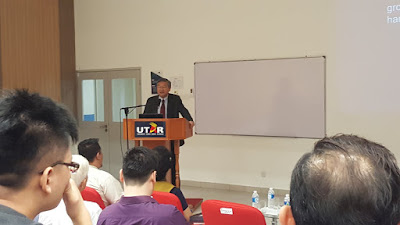"Book Launching and Public Lecture" Review

On the 25th of January 2019, we attended a seminar as recommended to by our lecturer, Mr Joe Yan. We were told that the topic we would write about for our weekly blog for the week would be the seminar and not a movie. He provided us with insight, mentioning that there was more to film studies and we would not get to understand those components further if we were to remain in our comfort zones. That being said, as a young adult that is not too involved with politics at this point in time, there were parts of the talk that confused me and therefore I did not include in this blog. I will be giving it my best effort to bring up points in the talk that most resonated with me.
Intro of the Lecture
The event took place at the multipurpose hall of University Tunku Abdul Rahman and began at 10am in the morning. The event started with the arrival of guests, followed by a book launch and public lecture on the book "Values to Bind and Build: A Reflection” by YBhg. Prof. Dato. Dato’ Dr. Tan Chong Tin. Dr Tan brought up a number of political issues that happen to be occurring in our country within this moment in time.
YBhg. Prof. Dato. Dato’ Dr. Tan Chong Tin started off by bringing up the recent riot that took place in the Seafield Sri Mariamman temple in Subang Jaya as an example of how much the state of ethnic relations in our country has deteriorated. He stated that in order to strengthen ethnic relations, we need to study it from multiple perspectives. Although it is important to know about the economic factors of ethnic conflict, other perspectives such as the psychological factors that cause ethnic conflict should also be taken into consideration, and should be adopted more.
Dignity Based on Being Recognized as Good
Further into the public lecture, Dr Tan claimed that in order understand the psychological drive to ethic harmony, one factor we need to understand is the role “dignity” plays in the equation. He explained the idea of competence as a basis for dignity. Dr Tan proclaimed that dignity is being recognized as being good. This means that people often tie their ow self-worth to how capable they are. This need for self-esteem is ultimately moral. According to the German philosopher Immanuel Kant (1724-1804), the basis of human rights and dignity is based on one’s ability to make “moral” decisions.
The idea of "soft power" works of this concept. Soft power is the influence based on attraction rather than coercion. To put it in simpler terms, it is the idea of appealing to another party not through using persuasive tactics and threats, but rather getting through to them using the idea of goodness. The fact that goodness is able to influence shows the basic urge of man to pursue goodness. A number of other countries have already adopted this concept and demonstrate soft power in order to gain respect. Examples of people within this group are the Norwegians, Swiss, and the Koreans.
Therefore, Malaysia should follow in their footsteps and take the first step to entering a more peaceful and harmonious era. Rather than using NEP's methods, which thrives off emphasizing comparisons of economic status among the people and indoctrinating etho-rivalry and the mindset that a particular race will have to "win" while another will "lose", we should we developing a non-competitive spirit and indoctrinate values such as generosity that will encourage us to work together in order to build a better society for people of all backgrounds to partake in.
The QnA Session
Before the event came to a close, a question and answering session was held which gave the audience a chance to participate and speak up about anything that they did not fully understand during the lecture. The host of the event was one of the people that partook in the session. He brought up a commercial that was spread around on Malaysian radio stations. The commercial consisted of Chinese Malaysian citizens stating, "I am not Chinese, I am Malaysian", Indian citizens stating, " I am not Indian, I am Malaysian", and Malay citizens stating, "I am not Malay, I am Malaysian". He questioned whether or not it was necessary for an individual to disassociate themselves with one part of their identity in order to more heavily relate to a different part of their identity. Identity is fluid and a person should be able to have multiple groups that they are able to feel like they are a part of without any of them cancelling each other out. Just like how while a parent of a child could identify as a mother, she can still identify as a daughter of her parents as well. Both descriptions are able to identify her without either being in conflict or of more importance than the other. In the same way, while one should be proud to be a Malaysian, it should not come at the expense of losing a different part of ones identity.
Comments
Post a Comment